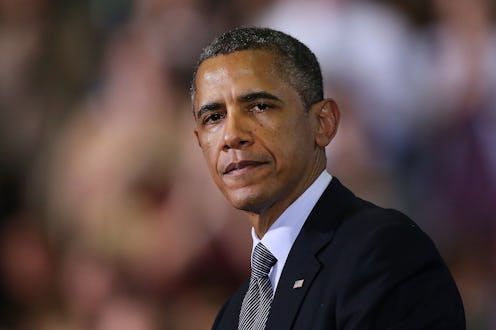News
His Midterms Speech Laid Bare His Frustration
Well, that didn't go so well. Tuesday's 2014 midterm elections were an unmitigated failure for the Democratic Party, with the Republicans seizing control of the Senate majority, and gained seats in the House. Now, President Obama will answer for the Republican tide, which washed through the U.S. Congress and state capitals alike — there will now be at least 31 confirmed Republican governors across the United States, including traditionally Democratic states like Massachusetts and Illinois. In President Obama's post-midterm press conference Wednesday, he tried to extend a bipartisan message to the GOP, though his frustration — and his enduring policy hopes — were still pretty evident.
As both the leader of the country and the Democratic Party, Obama has no choice but to shoulder some blame and offer some mea culpas, even though some of the Democrats who fell on Tuesday did so while conspicuously distancing themselves from him. This was particularly true of Kentucky Democratic Secretary of State Alison Lundergan Grimes, who was defeated by Senate Majority Leader-in-waiting Mitch McConnell in an unexpectedly robust blowout.
But now, all that a matter of the settled past, Obama has just two years left in the White House with a Republican-controlled House and Senate, in advance of a clash between whichever candidates ascend in the 2016 presidential primaries. How the parties interact with one another from here on out could lay the groundwork for the next general election, so everything — including what Obama said Wednesday — looms large. So, what exactly came out of it?
Given the circumstances, it's no surprise that the tone Obama struck was muted and somewhat conciliatory, even as he leaned on Republicans to cooperate with him in some areas which Tuesday's outcomes supported. He did acknowledge that not everything that came to his desk from this new GOP Congress was going to get signed, of course — in some ways, the ideologies of the parties are simply too divided. (Credit to the Washington Post's running transcript of the President's remarks.
I’m eager to make the next two years with Congress as productive as possible. Congress will pass some bills I cannot sign. I’m pretty sure I’ll take some actions that some in Congress will not like.
A number of conservatives on social media were rankled by a subtle dig Obama threw in early in his remarks, however, shouting out not just the people who voted against him, but the people who decided not to vote at all.
Still, as president, I have a unique responsibility to try and make this town work. So, to everyone who voted, I want you to know that I hear you. To the two-thirds of voters who chose not to participate in the process yesterday, I hear you, too.
He also acknowledged that, although his administration inherited a calamitous economic situation, and has largely turned it around over his tenure, the recovery hasn't touched Americans in as steadying and significant a way as it might, with so many people still struggling through low wages and uncertainty.
I think economically, I can look back and there is no doubt that on almost every measure, we are better off economically than we were when I took office. But, what is also true is there are still a lot of folks out there who are anxious and are hurting and are having trouble making ends meet, or are worried about their children’s future.
Obama also specifically called for bipartisan collaboration on a number of issues, though some of them, like an increase to the minimum wage, are probably pipe dreams given conventional GOP orthodoxy.
- He plans to ask Congress to help fund the doctors and troops dedicated to combating Ebola in West Africa — according to recent reports, he's hoping for a $6.2 billion in funds.
- He stressed an interest in striking a deal for improving the nation's infrastructure, which has long been an issue he's tried to rally bipartisan support for, but has typically been met with resistance.
- He also called for an agreement to be struck on a new budget for the remainder of the fiscal year.
He also spoke out on his oft-discussed decision to delay a planned executive order on immigration, making it clear that he still intends to move forward with the order, and is growing impatient with criticisms that it would weaken the chances for a comprehensive reform bill. This frustration makes sense — the House GOP was never going to pass the bipartisan immigration reform bill that the Senate did, which is why he's been forced to move towards an executive order.
Some of the biggest and most consequential news Obama actually broke, independent of any post-mortem Democrats' bad election night, is this: He'll be pushing for a new Authorization of Military Force (AUMF) against ISIS. Up until recently, the administration had asserted that the existing AUMF passed in 2002 to authorize the Iraq War was adequate grounds for action against ISIS.
Images: The White House (2)
